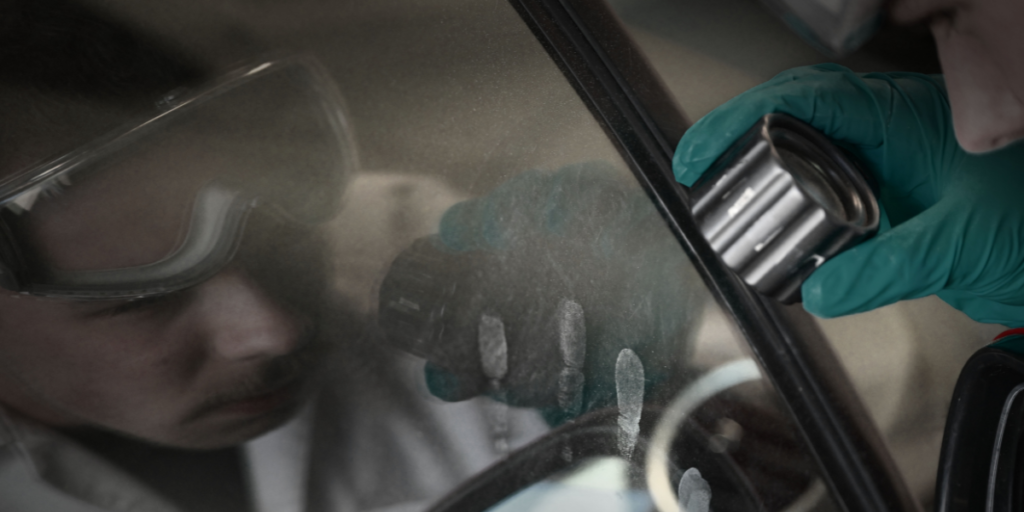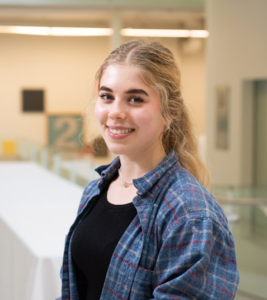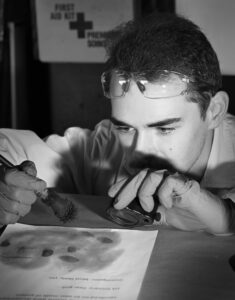
For students studying the Combined Honours in Biochemistry and Forensic Science program, learning doesn’t end in the classroom. Just ask Kristen Hardy and Quinn Braaten, two students who recently completed co-op placements with the RCMP. From analyzing toxicology samples to collecting fingerprints at crime scenes, their experiences reveal how this interdisciplinary program equips students for real-world careers in science and justice.
Why do students choose to study biochemistry and forensic science?
Kristen Hardy’s interest in forensic science began the way it does for many young students – with a fascination for true crime. But her academic ambitions stretched beyond TV storylines. “I still wanted that more academic, or ‘classical’ science education as well,” she says. “This is why the combined biochemistry and forensic science degree from UBC and BCIT was perfect for me.”
That combination – rigorous lab science paired with applied forensic training – is what drew both Kristen and her classmate Quinn Braaten to the program. “I knew I wanted to do science over arts,” says Quinn. “But also having that variety of justice system-related forensics courses was super interesting to me, and really made the program unique.”
What’s it like to do a co-op with the RCMP in forensic science?

For both students, the highlight of their academic journey so far has been the co-op experience. Through placements with the RCMP, they gained hands-on exposure to real cases, cutting-edge lab techniques, and the inner workings of Canada’s largest policing organization.
Kristen worked in the RCMP’s Forensic Toxicology Lab, where she conducted research and assisted with general laboratory duties. “The people there were so welcoming and willing to show you what they do,” she says. “I really enjoyed the personal project they gave me. It gave me a better idea of the types of daily tasks a forensic toxicologist has, and the academic pathways to that type of career.”
She also appreciated the opportunity to learn across departments. “It was neat to meet everyone working in the different departments of the forensics lab and compare the duties of the various forensic specialists.”
What does a forensic co-op student do at a crime scene and in the lab?
Meanwhile, Quinn was placed with the RCMP’s Forensic Identification Services (FIS) unit, where he got a front-row seat to crime scene investigations. His Co-op wasn’t just about lab work – it was about putting science into action.
“In my experience at FIS, there are three main places I spend my time: the scene, the lab, and the office,” Quinn explains. At crime scenes – ranging from break-and-enters to homicides – he collected fingerprints, DNA, and footwear impressions. “We’ll often walk through the scene ourselves, visualize how it went down, and imagine where the suspect might have left evidence.”
In the lab, he used chemical and photographic techniques to analyze the evidence he had gathered. “These exhibits can really be any object imaginable, so it’s been a great way for me to figure out new ways to deal with different kinds of evidence.”
The office work, he adds, tied everything together: enhancing fingerprint photos in Photoshop and comparing them against national databases. “It’s a huge privilege to contribute to the justice system,” Quinn says. “To be in a position where I know I’m making a real difference is extremely rewarding.”
How does a co-op help students plan their careers in forensic science?
Both students found their co-op terms eye-opening – not just in terms of job responsibilities, but for the clarity it gave them about their futures. “It gave me a better idea of what the process of becoming a fully qualified expert looks like,” says Kristen. “It really helped solidify my interest in forensic toxicology.”

For Quinn, the co-op turned into something more: a possible career path. “FIS has offered me a spot in the Lower Mainland after graduation, and it’s definitely something I’m considering,” he says. He’s also weighing other options, including law school. “What’s great about our program is that it shows us and prepares us for so many different directions we can take our lives.”
What advice do students in biochemistry and forensic science have for others?
Both Kristen and Quinn agree that the program is demanding, but also deeply rewarding. “Study hard,” Kristen advises. “Participate in classes and keep in contact with your professors and instructors. Connections to people in the industry are probably one of the most powerful tools you will gain.”
She also encourages students to reach out to professionals, even if it feels intimidating. “People are much more likely and willing to help you than you might think. Just go for it, you have nothing to lose and everything to gain!”
Quinn echoes that advice. “Do the co-op program,” he says. “Even if there’s no ‘perfect forensics co-op’ at the time, there is so much good experience out there just waiting to be had.” He also highlights the importance of peer support in the program: “Make as many friends as you can. Having a good group of people to work with and support each other is really important.”
For those thinking about a future in forensics – or science more broadly – the program opens many doors. “Of course, there are parts where it can be really tough,” says Quinn, “but the things it has taught me, the opportunities it has given me, and the people it has introduced me to have definitely made it worth it.”
What’s next for students after a co-op in forensic science?
Kristen is currently wrapping up her final semester and looking forward to some well-earned rest. “Right now I’m just looking forward to graduating and going on vacation,” she laughs. “I definitely see myself doing a science-related career, which this program has prepared me for.”
Quinn is still completing his co-op term and will return to classes in the fall. Whether he ends up at FIS, law school, or somewhere entirely different, one thing is certain: “This program has been awesome and I’m really glad I chose it.”